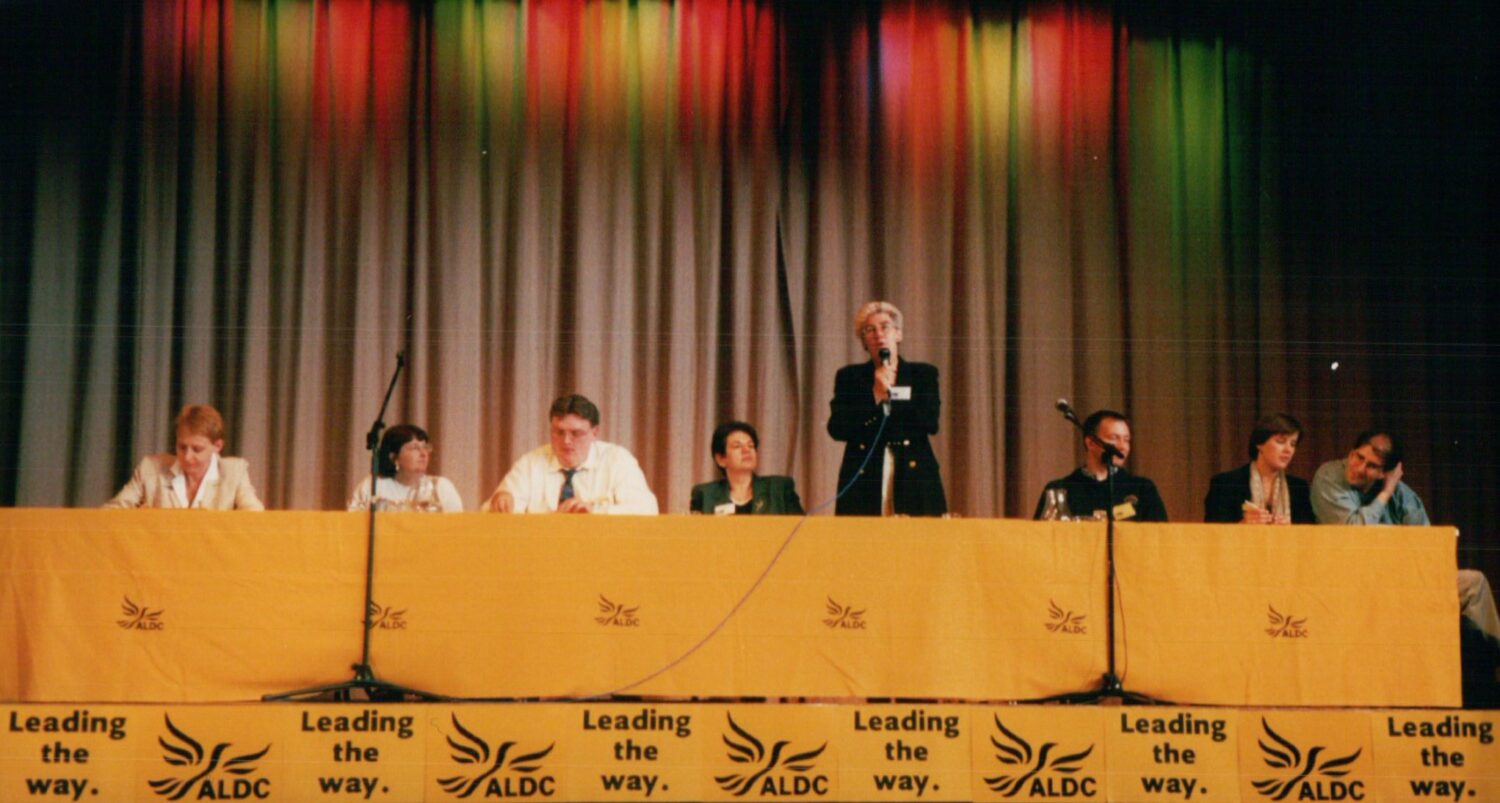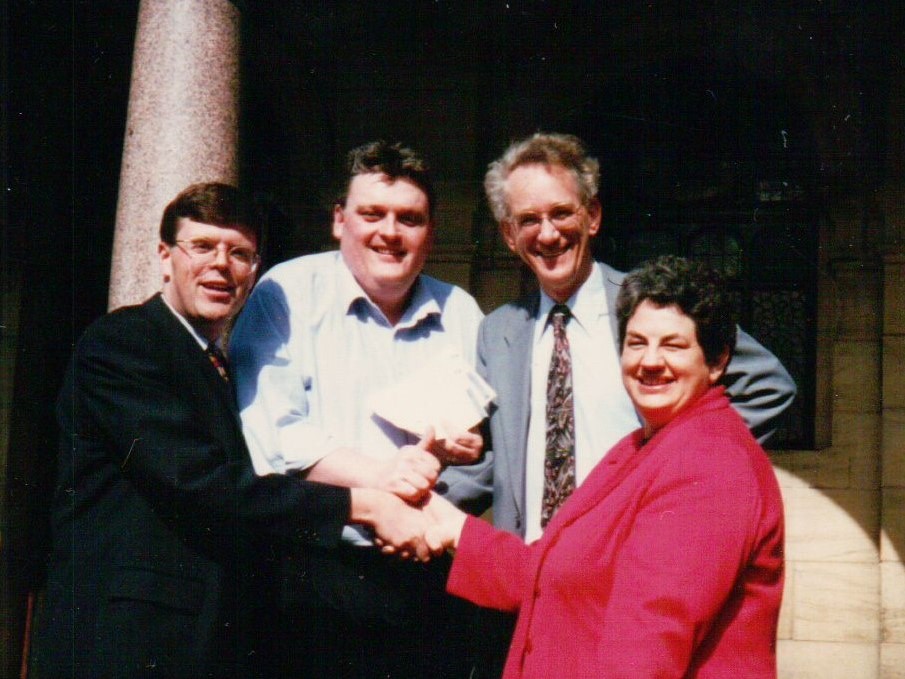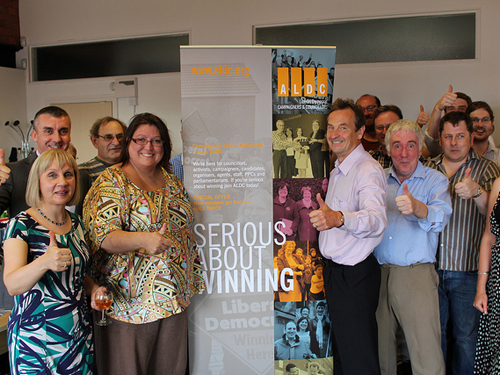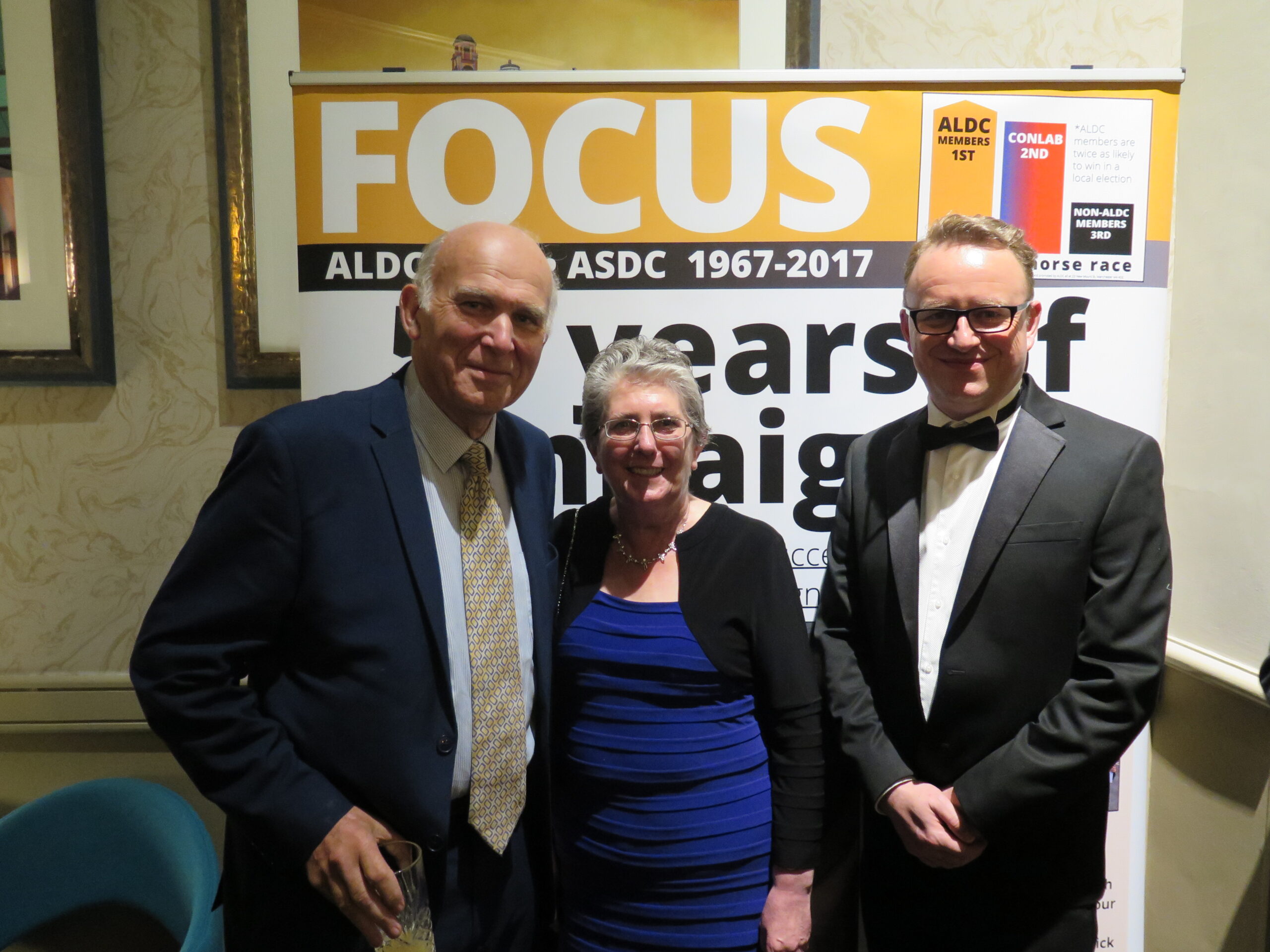Read on to find out about our rich history of over 50+ years’ supporting community campaigning and local Liberal politics across Britain.

ALDC Conference in Royal Leamington Spa in the late 1990s.
A plan to build an organisation centred on local government had been milling around Liberal Party circles since the end of the war, with an advisory committee created to look into the proposition in 1946. Richard Wainwright took the idea further in the 1950s by setting up a local government headquarters at the Liberal Party HQ (also known as the LPO, or Liberal Party Offices). Following a difficult set of elections for the national party in 1964 and for Liberal councillors in 1965, it was concluded that a councillors’ organisation should exist independently of the LPO.
The original Association of Liberal Councillors (ALC) developed into a fully-fledged organisation between 1965 and 1969. This period is book-ended by Michael Meadowcroft’s Leamington Conference in 1965 (at which councillors indicated that they would be willing to fund an independent local government body by subscription) and the ALC’s recognition by the national party as a ‘recognised body’ in 1969.
Given the four-year process by which it was formed, we tend to split the difference and fix the date of ALC’s birth to 1967.
From this point, ALC began to produce regular campaign-oriented ‘bulletins’ and training visits to local parties across the country. Some in the national party were unhappy at ALC’s emphasis on ‘community politics’ and local activism, but a successful council by-election campaign in Liverpool, run by incoming ALC President, Trevor Jones, achieved a 41% swing to the Liberals and prompted his famous reply:
You may not be ready for the methods, but you may be ready for the results!
Throughout the 1970s, membership of the association grew, as did its profile within the party. In 1975, ALC took its first stall at federal conference, a tradition which is alive and well to this day!
In 1977, ALC moved its offices into the Birchcliffe Centre in Hebden Bridge, West Yorkshire. Tony (now Lord) Greaves was appointed the association’s first full-time member of staff in 1977, and was followed by a second in 1978.
In the 1980s, ALC added support for councillors in positions of control or influence to its work (both to increase the quality and to prevent councillors ‘going native’ in town halls!). The birth of the SDP also led to the first Social Democratic councillors and the beginnings of co-operation between the two parties.

Bill Le Breton working in ALC offices.

Tony Greaves – 1985 County Manifesto.
By 1987, there were five staff members and over 1,000 more Liberal/Alliance councillors than ten years before. ALC had also begun co-ordinating mailings with the whips office in Westminster to provide a news service integrated with the national party. Through the party’s tough ‘merger’ period that followed, ALC and its counterpart ASDC combined to form ASLDC in 1988 and, after a miserable set of elections in 1989, it was widely credited with “saving the party” through the ‘People First’ campaign.
The 1990s saw the growth of regular ASLDC publications with campaign ideas and ‘drop-in’ artwork packs filled with template stories and ideas for local leaflets. The 1997 election proved a (not unwelcome!) challenge when three of ALDC’s staff members – Andrew Stunell, Jackie Ballard and Paul Burstow – were elected to parliament. Howard Sykes became Chief Executive shortly after Andrew departed to his new role in Hazel Grove and Westminster.

Three members of ALDC staff being given their P45s following their election to Parliament in 1997. Jackie Ballard MP, Paul Burstow MP and Andrew Stunell MP, with ALDC Chief Executive, Councillor Howard Sykes, on the steps of the Birchcliffe Centre, Hebden Bridge in 1997.

ALDC stand at Birmingham conference in 1996.
The early 2000s saw a continuing increase in the number of Liberal Democrat councillors, which hit a peak of 4,700 in 2006. In addition to regular publications and training, the ALDC website and residential Kickstart training weekends were added to the range of services offered to members. In 2006, Tim Pickstone became Chief Executive and added the MyCouncillor network of websites to the list – with each ALDC member able to create a free, online space to blog about local events and display contact details.
Towards the end of the 2000s, ALDC also developed regular email-based briefings for members and local election candidates. We also started to provide election law advice for Liberal Democrats – with ALDC regularly providing the Election Law Helpline for the whole Party each General Election.
The 2010 coalition changed the political landscape massively, with many respected and hard working colleagues losing their council seats. ALDC adjusted, with a greater focus on winning and holding seats and the Party has moved forwards in most local elections since with the 2019 local elections being the most successful in the Party’s history.
ALDC expanded to meet this increased campaigning workload, employing a team of Development Officers around the country from 2012 onwards. Most recently this has seen further expansion with the appointment of much needed full-time Development Officers in Scotland and Wales, as well as Regional Development Officers with most of the Regional Parties in England. Part of this growth was funded by an expansion of ALDC’s own fundraising, launching the ALDC Fighting Fund to support local authority by-election campaigns and help areas starting out with campaigning and the ALDC Local Election Appeal to support our candidates each May.

ALDC Chair, Councillor Claire Hudson, at the opening of the new ALDC Offices in Manchester in 2013.

Party Leader, Sir Vince Cable MP, with ALDC President, Baroness Councillor Kath Pinnock, and ALDC Chief Executive, Councillor Tim Pickstone, at the ALDC 50th Anniversary Dinner in 2017.
In 2013, ALDC left Hebden Bridge after 36 years, moving first to Manchester city centre (23 New Mount Street) and five years later to Exchange Quay in Salford, Greater Manchester. Kickstart grew from being an annual event of around 100 participants to being a twice-yearly event with anything up to 400 participants at each one with the events at Yarnfield Park in Staffordshire becoming a key part of the Liberal Democrat calendar. In 2019 ALDC launched its online literature tool, ALDC Artworker and in 2020 responded to the Covid crisis moving all training online, including the November Kickstart Online, the largest training event in the Party’s history.
In 2023 ALDC celebrated reaching over 4000 members as the Liberal Democrats continued to grow as a force in local government. We now support Lib Dem groups who either lead, or have the deputy leadership, of over 70 council’s across Britain.
Chairpersons
ALC (Association of Liberal Councillors)
- Before 1976: David Evans, Cyril Carr, Peter Freitag
- 1976-1984: Councillor Trevor Jones (Dorchester)
- 1984-1988: Councillor John Pigott (Wigan)
ASDC (Association of Social Democrat Councillors)
- Before 1988: Councillor John Strak (South Ribble)
ALDC (Association of Liberal Democrat Councillors)
- 1988-1989: Councillor John Pigott (Wigan)
- 1989-1990: Gordon Lishman (Burnley)
- 1990-1995: Bill Le Breton (Isle of Wight)
- 1995-2000: Councillor Sarah Boad (Warwickshire)
- 2000-2003: Andrew Wiseman (Harrow)
- 2003-2008: Councillor Sarah Boad (Warwickshire)
- 2008-2012: Councillor Kath Pinnock (Kirklees)
- 2012-2016: Councillor Claire Hudson (Mendip)
- 2016-2020: Mayor Dave Hodgson (Bedford)
- 2020- Councillor Prue Bray (Wokingham)
Presidents
ALC (Association of Liberal Councillors)
- 1984-1988: Phoebe Winch
ALDC (Association of Liberal Democrat Councillors)
- 1988-1989: Phoebe Winch
- 1989-1990: Councillor John Pigott (Wigan)
- 1990-1994: Councillor Tim Razzell (Richmond)
- 1994-1995: Councillor Sally Hamwee (Richmond)
- 1995-1997: Bill Le Breton (Ribble Valley)
- 1997-2000: Jackie Ballard MP (Taunton)
- 2000-2001: Adrian Sanders MP (Torbay)
- 2001-2006: Andrew Stunell MP (Hazel Grove)
- 2006-2009: Lord Mike Storey (Liverpool)
- 2009-2014: Veronica German AM (Torfaen)
- 2014-2018: Councillor Baroness Kath Pinnock (Kirklees)
- 2018-2022: Baroness Ros Scott (Mid-Suffolk)
- 2022- Tim Farron MP (Westmorland and Lonsdale)
Chief Officers
ALC Organising Secretary
- 1978-1985: Councillor Tony Greaves (Pendle)
ALC / ALDC General Secretary
- 1985-1989: Councillor Maggie Clay (Leeds)
ALDC Political Secretary
- 1989-1996: Councillor Andrew Stunell (Cheshire, Stockport)
- 1996-1997: Councillor Paul Burstow (Sutton)
ALDC Chief Executive
- 1997-2005: Councillor Howard Sykes (Oldham)
- 2005- Councillor Tim Pickstone (Bury, Cumberland)
Honorary Vice Presidents
ALDC (Association of Liberal Democrat Councillors)
- 2001: Councillor Fred Ridley (Stockport)
- 2019: Councillor Willie Wilson (Perth and Kinross)
- 2022: Councillor Ruth Donbey OBE (Sutton)
- 2022: Councillor Howard Sykes MBE (Oldham)
- 2022: Lord Sir Andrew Stunell (Hazel Grove)
Former Honorary Vice-Presidents
- 2007-2021: Councillor Lord Tony Greaves (Pendle)
- 2007-2009: Councillor Maggie Clay (Leeds, Stockport)